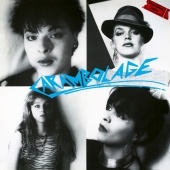
Carambolage
Eilzustellung - Expres
Label: Tapete
Genre: 80s Wave / Rock / Pop / Punk
Availability
- LP €26.99 Dispatched within 5-10 working days
Like a whirlwind girl gang on the road, the LP revs up with dynamic guitar riffs, indulging their »turned on to the max« sexual desires, before the mood shifts to the deeper realms of life on the Eilzustellung-Exprès (express delivery): melancholy musings on dismaying love affairs, a song about contradictory feelings experienced in childbirth, culminating in a declaration of love for Angie’s new daughter Lisa. The baby was always on board when Carambolage went on tour. The idea of her father Kai Sichtermann (Scherben bass player) taking her on tour would have been too much even for the left-leaning alternative Ton Steine Scherben. Making a mockery of male privilege, Carambolage delivered an album orbiting punk and pop in a classic line-up: Britta on drums, Elfie‘s snotty vocals and effects-drenched guitar and keyboards, Angie on bass. The trio is augmented by Janett’s screeching saxophone on the instrumental track ›Maschine‹ and a squeaky baby sample (Lisa?).
›I Remember You‹ brings proceedings to a close in something approaching Schlager*.
Carambolage never set out to be a »girl band« but they were one of the first German new wave bands whose members were all female. The punk alliance comprising Britta Neander, Elfie-Esther Steitz and Angie Olbrich emerged organically from the environs of Ton Steine Scherben, friends united by a common interest in musical experimentation.
Britta’s passion for the drums ignited in 1974 in Fresenhagen, North Frisia, where she played percussion for Ton Steine Scherben. What she really wanted was her own band, so she looked around for kindred spirits. R.P.S. Lanrue’s little sister Elfie-Esther was an obvious candidate. Angie, a child from the streets who joined the commune in 1972, completed the line-up. If you think that they simply followed in the Scherben slipstream, you’d be wrong: Carambolage surfed on their very own »North Frisian Wave« - an epithet dreamed up for their distinctive sound. Shortly before her death in 2004, Britta was interviewed by music journalist Tine Plesch and described how the »girls gang« gave them the freedom to experiment and come up with »these really funny, filthy lyrics«. There is a childish, subversive charm to the songs, emboldened by the realization that »we could fool around as much as we wanted.«
Their sound was not the only aspect of the group which resulted from experimental tinkering. Keen to have their own space, away from a male-dominated environment, they used cardboard and carpets to build their own practice room inside an old grain silo. Strictly out of reach of the Scherben. It’s fair to say that Carambolage helped to shape the DIY approach which the Riot Grrrls of the 1990s would emulate.
Forty years later, it’s still mostly men standing on festival stages, but the Carambolage story ought not be consigned to the shelves marked nostalgia. On the contrary, it is a thread which most definitely needs to be picked up. As Julie Miess, who later joined Christiane Rösinger and Britta in the Lassie Singers offshoot Britta (the band) noted so succinctly in her Carambolage text (›Damaged Goods‹, Ventil Verlag):
»Role models every seven-year-old girl should have!«
